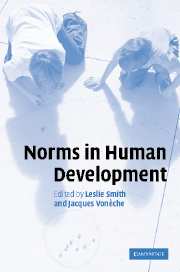Book contents
- Frontmatter
- Contents
- List of figures
- List of tables
- List of contributors
- Acknowledgments
- 1 Norms in human development: introduction
- Part I Norms and development in epistemology
- Part II Norms in moral and social development
- Part III Norms in cognitive development
- 9 Can psychology be a quantitative science, or is Kant right after all? Normative issues in psychometrics
- 10 Norms and intuitions in the assessment of chance
- 11 Making conditional inferences: the interplay between knowledge and logic
- References
- Index
9 - Can psychology be a quantitative science, or is Kant right after all? Normative issues in psychometrics
Published online by Cambridge University Press: 22 September 2009
- Frontmatter
- Contents
- List of figures
- List of tables
- List of contributors
- Acknowledgments
- 1 Norms in human development: introduction
- Part I Norms and development in epistemology
- Part II Norms in moral and social development
- Part III Norms in cognitive development
- 9 Can psychology be a quantitative science, or is Kant right after all? Normative issues in psychometrics
- 10 Norms and intuitions in the assessment of chance
- 11 Making conditional inferences: the interplay between knowledge and logic
- References
- Index
Summary
In a recently published collection of essays on the collapse of the fact/value dichotomy, Hilary Putnam (2004) presents an ‘eloquent demolition of the dichotomy between judgments of fact and judgments of value’ (Martha Nussbaum's commentary cited in Putnam, 2004). In those essays the dichotomy between fact and value judgment is accused of having ‘corrupted our thinking about both ethical reasoning and description of the world, not least of all by preventing us from seeing how evaluation and description are interwoven and interdependent’ (Putnam, 2004, p. 3). Compelling arguments are given against the tenability of both the classical empiricist (Hume) and the logical positivist (Carnap) definition of ‘facts’ in terms of ‘observation terms’. Putnam concludes that ‘from Hume on, empiricists – and not only empiricists but many others as well, in and outside of philosophy – failed to appreciate the ways in which factual description and valuation can and must be entangled’ (2004, pp. 26–7; italics in original).
This demolition of the fact/value dichotomy into nothing more than a distinction concerning mutually entangled fact–value complexes (e.g. thick ethical concepts; Putnam, 2004, pp. 34–43) is of great importance for social scientists who have been raised in the long era in which logical positivism reigned. It extends the domain of social-scientific research to facts and values, whereas previously value judgments were banned from scientific consideration because of their subjectivity.
- Type
- Chapter
- Information
- Norms in Human Development , pp. 211 - 219Publisher: Cambridge University PressPrint publication year: 2006
- 1
- Cited by



